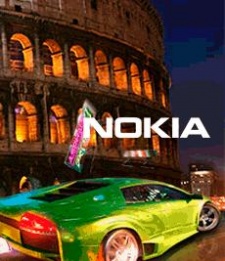Scott Foe took the stage at today's Nokia Games Summit to present 'N-Gage Success Case: Reset Generation', focusing on the innovative game of the same name, which Nokia has been using as a flagship game for N-Gage.
"What we really developed from the ground up was the brand the characters, the story, the gameplay experience," said Foe, who said the best way he's ever seen the anatomy of a videogame described is a combination of Hobby, Story and Sport (there was a pic of Will Wright on the slide at this point, so presumably he said it).
Anyway, Foe says Reset Generation is a trans-media property, and went into what this means. "First, you have to decide on the reality of the universe," he explained. Is the game universe exactly like ours, slightly different or completely different?
Characters are important - "people relate to other people, or at least characters they can project themselves onto". He said the rule of subtraction is important can you take a character out of a game, movie or other property, can they carry something on their own and how does their universe shape up without them?
There's also the Halloween Test if you dress up as a character for Halloween, would people recognise them instantly? If so, that's a strong character.
Moving on, almost 10,000 people downloaded the soundtrack for Reset Generation from IGN. That's probably enough to get into the Top 10 album charts these days...
Foe also talked about development cycles. In console, there's a long period of development, which could be anywhere between eight months and five years - "What stays the same is that you get to the end of the cycle, and you have two weeks to sit on the retail shelves and sell, and if you don't, you flop into the bargain bucket."
The life cycles are different for mobile gaming a game could be in development for 2-4 months (although Reset Generation took two and a half years), but the sales period is much longer, because there's no seasonality. "There's no hard launch, it's all soft," said Foe.
Onto 3D. "I question this race towards 3D graphics. You build something in 3D, and 18 months later, you get something that looks outdated. And people who see a 3D game on mobile are going to compare it to the 3D games they see on consoles. I question the wisdom of 3D for the sake of 3D."
He continued. "A good 2D game is not perishable. Our friends at EA haven't done much with Tetris down the years, apart from make a million bajillion dollars! That's because it's imperishable."
Foe also slammed mobile games where you turn them on and the first thing you see are system fonts on the opening menu screen. "It just feels low-quality from the get-go," he said. "People feel like they're having a better experience if the experience looks better."
So in Reset Generation, Nokia made an effort to have the characters appear from the start, the menus were all animated, and the company tried to provide "quality from start to finish, rather than crappy text menus".
Foe also questioned the wisdom of current PR campaigns. "Maybe we should amp up our marketing once the game has launched, and continue to market it through the sales cycle," he said.
He also dealt with the web-to-mobile thing. "Do you use your website to sell the game, or do you use it to foster community and stickiness?" he said. Reset Generation took the latter option although interestingly, the ease with which people can play for free online and interact that way may have harmed the actual sales of the N-Gage game.
Foe himself said that Reset Generation is the most popular game on the N-Gage Arena community.
He also talked about the way Hollywood uses well-known stars to persuade filmgoers to watch new films (or 'new IP'). Do we need more stars in mobile games? "I blame the media," said Foe. "They need to make stars in mobile games. If you go out and see someone making great mobile games, write about it as much as you can."
Yeah!
Foe also it was a rapid and wide-ranging presentation said developers need to use the capabilities of the mobile platform. Connectivity, for example. Reset Generation has nearly 100% of all multiplayer traffic on N-Gage, and about 75% of ALL online traffic on N-Gage, including rankings and other elements.
Meanwhile, 80% of Reset Generation's online users are playing from their phones a stat which actually goes against the perception that lots of people are playing from their PCs for free. Lumme.
"Another thing that's really powerful about the platform is that everyone has their own display," said Foe. "What if one player was playing a puzzle game, where he powers up a player playing a shooting game? They're not playing the same game, but they are interacting."
Back to the press, and a warning. Mobile phones are getting much more powerful, in terms of graphics, sound, new features like location all heading to the phone becoming the central device in your entertainment lifestyle.
"All of these features that everybody's writing about are just features. Features are not an experience."






















